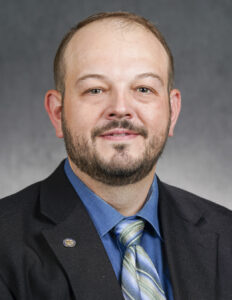
Candidate Biography:
I’m the current State Representative for District 18A, and previously served a term in 2019-20. Prior to that I served two terms with the Saint Peter City Council. My wife and graduated from MSU-Mankato and turned our love of nature into a small business serving the area for over 13 years. We have two children, and we live in Saint Peter. I grew up on a dairy farm and am proud to be a 5th generation Minnesotan working and shaping the land that we farm. I’ve received five awards in my time at the Legislature including “First Term Legislator of the Year for my advocacy in Greater Minnesota. My focus over the last two sessions included rail safety and the world’s strongest ban on forever chemicals (PFAs).
Candidate Questionnaire:
1. Why should voters elect you to serve the position you seek?
I have had a great relationship with the constituents that I have represented in District 18A over the years. I’ve been recognized by the nonpartisan group called Majority in the Middle as one of the most bipartisan House members in Saint Paul. I work across the aisle to deliver results. In divided government, I secured funding for Highway 14 to complete 4 lanes from Nicollet to New Ulm. During the past two years I have continued to work across the aisle when many of my colleagues did not. In a politically purple district, it has been asked several times that we work together. Not only is “working better together” my campaign slogan, it is also how I operate. And I believe that rising above politics is what earns support of the district during an election. I also spend a lot of time listening to constituents and voters to get a better sense of what people look to state government in order to address.
It is my sincere hope that a voter in District 18A will look at my record as someone that represents the entire district. I believe in building stronger communities – that is the value that drives me as an elected official. I believe in strong schools, affordable healthcare, safe roads, and a vibrant economy. A vote for me is a vote for a Minnesota that we can all proudly call home.
2. What would you say are the key issues facing the city/district/county/state you seek to represent and how would you impact them from this elected position?Fully funding public education, creating a fairer tax system, and strengthening our local economy. Focusing on all three of these issues will help create a Minnesota that is prepared for a more successful future.
I want to create smaller class sizes in our area schools. I know that is something that our local school boards are committed to. We need to support our students with mental health support, and I’m proud that we removed hunger as a distraction from learning. We still have to continue to recruit and retain high quality teachers. And just as with increasing Local Government Aid and County Program Aid, increasing school funding will reduce our local property tax burden, keeping down our cost of living.
I’m proud of the work that we accomplished in passing the largest property tax cut in decades. We increased Local Government Aid, County Program Aid, and School aid to support the mission and services provided by our city, county and school partners. Last year I worked to provide dedicated tax relief to small cities and townships so that they can maintain their infrastructure. Some tax priorities include stabilizing the fluctuating agricultural land valuations farmers face and incentivizing shuttered commercial property conversions in Greater Minnesota so they can open once again to diversify the tax base and provide services for communities.
We are a quarter of the way into the 21st century, yet we lack border to border broadband internet, and our workforce is aging out into retirement. We must continue to improve childcare availability and affordability to ensure workforce participation amongst working families. We must attract new Minnesotans by continuing to provide higher wage jobs and benefits like sick & safe time and paid family leave that employers in other states aren’t.
3. In your view, what is the role of the body/office you seek in supporting business vitality and economic development?
The State has a critical role to play in supporting business vitality and economic development. I believe that programs such as Paid family leave and sick & safe time provide an opportunity for employees to be their best self when at work. We do know that employees are three times more likely to quit their jobs when there are no support programs in place at work.
These programs are in place to help workers that need time off to connect with their newborn or to care for a sick loved one. By having these programs, we have leveled the playing field between Fortune 500 companies in the metro area that are taking in more of our workers and allow Greater Minnesota businesses the opportunity to recruit from
other states and retain their quality employees. I personally amended the legislation to allow for a small business exclusion so that the smallest businesses aren’t adversely affected by cost to provide this benefit to their employees.
Business vitality has always been important to me, and I want to continue supporting entrepreneurs that want to take a chance and to branch out on their own. Competition is good for everyone, including customers – it’s the monopolies that hurt our economy the most. The state legislature has a role to play in anti-trust practices. For instance, we can build up a more locally distributed food system that supports local food growers.
As the Vice Chair of the Workforce Development committee, I have been working to make Minnesota more welcoming to new Minnesotans so that they can feel that sense of belonging in our community. Comprehensive immigration reform at the federal level will allow us to see our full potential in our workforce, especially when our low unemployment rates eclipse the national average.
4. The effective and efficient use of public tax dollars is a key component to serving in public office. What experience do you have dealing with complex budgets? When presented with a budget that will often be several hundred pages in length, what will be your process to determine if it is a good budget? What improvements would you recommend to improve the fiscal responsibility for the body/office you would represent if elected?
I‘ve helped shape eight Saint Peter city budgets, two state budgets, two supplemental budgets, two tax bills, and two capital investment budgets. The major task as a legislator is to pay attention to the details, which can easily be done by following the individual committee process. Each committee proposes an omnibus bill, which is vetted before being passed. It goes onto the finance committee for further discussion, before going to the floor for even more discussion. The budgets are posted online and are drafted in line-item fashion. The differences between the House and Senate bill are worked out in conference committee hearings before going to a final vote, then off to our Governor to sign or veto.
I’d like to reform this process in the future as the conference committee process is often done by chairs outside of the committee. I also think that there should be time limits on floor debate, a limit to the number of bills introduced, and that bills should be more often be passed out as stand-alone legislation rather than omnibus bills. I believe that these reforms will make the process more efficient and provide for more time to be productive.
The public has been vocal about fiscal responsibility for several years, and unfortunately there were a few recent disappointments in which fraud occurred. I really appreciate how DEED operates their grants program – they have a reporting system that ensured to the penny where nonprofit organizations have spent their money. With Feeding our Future, the State should have provided the area school districts with the resources to distribute these funds, giving one more layer of accountability.
5. Compromise and consensus are a crucial part of bringing conflicting views/positions together to get decisions made in a democracy. How will you go about working with other elected officials of varied political backgrounds to build the consensus necessary to govern for the benefit of citizens?
I am a recognized leader in Saint Paul for working across the aisle by the nonpartisan group called The Majority in the Middle. There are some pieces of legislation that did not get included in committee omnibus bills in the past two years because they did not fit the interests of the district. There were bills that I amended to build more consensus. I signed onto and lobbied for Republican bills to be passed because they were beneficial to the state.
I supported a bonding project for a memory care facility in Slayton and another was for the creation of $100 fine for littering on frozen lakes. Once we found out that the education policy bill contained a critical error for School Resource Officers, I worked across the aisle and told leadership that I would not support a fix unless it was bipartisan, vetted by law enforcement, and supported locally by our schools. I supported $174 million for nursing homes and $300 million for law enforcement in cities and counties.
I recently travelled to Washington DC on the bipartisan EMS task force. We met with our Minnesota Congresspersons and visited the White House to discuss how Minnesota is going to turn our EMS crisis around together. There are many bills that pass in which the voting board is all or mostly green because they are bipartisan in nature.
I believe we are better served as a body when we are civil to one another, don’t invoke personalities, and focus on what matters most to the people that we represent in our individual districts. I think that is what we all want, and it is what my constituents deserve. That does not mean anyone has to give up their values in the process.







